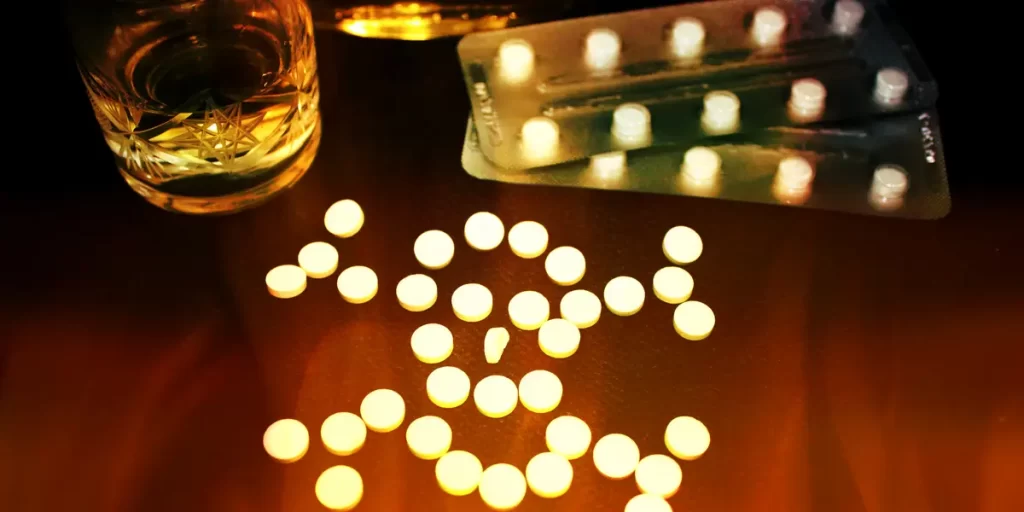Is it Safe to Mix Valium and Alcohol?
Written by Rob Alston
& Medically Reviewed by Kathleen Oroho Linskey, PharmD
Medically Reviewed
Up to Date
Last Updated - 6/17/2022
View our editorial policy
Valium is the brand name for diazepam, a benzodiazepine medication and controlled substance that is only available by prescription. Benzodiazepines are classified as central nervous system (CNS) depressants because they cause a slowing of certain brain functions and processes. As a CNS depressant, Valium works as a sedative, anxiety reducer, muscle-relaxer and anticonvulsant.
Because Valium is a CNS depressant, it can cause certain side effects including:
- Drowsiness
- Dizziness
- Impaired coordination
- Slowed breathing and heart rate.
When Valium is taken with other CNS depressants, such as alcohol, these effects can be intensified.
Mixing Valium and alcohol is not recommended, and extreme caution should be used when they are taken together. Valium and alcohol are both popular substances of abuse and, when taken together, they can cause profound sedation, respiratory depression, impaired coordination, coma and even death.
Understanding what happens when you mix Valium and alcohol and the risks associated with this combination can help you better recognize the signs of misuse of these substances.
Why Do People Mix Valium and Alcohol?
There are many reasons why people may use Valium and alcohol together. Some people may have legitimate prescriptions for Valium and may consume alcohol while unaware that there is a dangerous interaction between the two substances. Others may use both substances recreationally as substances of abuse. Regardless of why or how the substances are mixed, Valium and alcohol interaction is dangerous, and the combination should be avoided.
Valium stays in the system of an average person for at least 20 days because it has a long elimination half-life. This means that a person who is sensitive to the interaction between alcohol and Valium could experience effects for 20 days, possibly more, after their last use of Valium.
Effects of Combining Alcohol and Valium
The effects of combining Valium and alcohol include:
- Drowsiness
- Dizziness
- Increased risk for overdose
- Slowed or difficulty breathing
- Impaired coordination and motor control
- Unusual behavior
- Memory problems
The dangerous effects of Valium and alcohol can occur at relatively small doses, so extreme caution and care should be used when Valium and alcohol are used together.
It is important to know that Valium and alcohol are both popular substances of abuse, so people struggling with substance abuse may use both substances to achieve a high or to minimize withdrawal symptoms.
Risks of Mixing Valium and Alcohol
The side effects of mixing Valium and alcohol range from mild, such as feelings of dizziness, to severe, including respiratory depression or coma. The greatest risk associated with Valium and alcohol overdose lack of oxygen in the brain which can lead to death.
Symptoms of a Valium and alcohol overdose include:
- Excessive drowsiness
- Confusion
- Slowed breathing and heartbeat
- Pale, ashen or blue-colored skin
- Inability to swallow
- Seizures
- Loss of consciousness
If you or someone you know is experiencing symptoms of overdose from Valium and alcohol, you should seek immediate medical attention. Call 9-1-1 to ensure that the overdose is properly managed by trained healthcare professionals for the best possible outcome.
Treatment for Valium and Alcohol Addiction
It is possible to develop a physical and psychological dependence on Valium and alcohol, which can lead to addiction. While Valium and alcohol addiction can be overwhelming, treatment is available and you do not have to fight for recovery on your own.
Valium addiction treatment will typically include medical treatment of any withdrawal symptoms along with psychological care to prevent relapse. Trained professionals will use evidence-based methods for a better chance of long-term recovery.
Recovery from Valium and alcohol addiction is possible, and comprehensive treatment programs can be a start for lifelong healing.
If you or a loved one is struggling with Valium addiction or alcohol addiction, The Recovery Village Ridgefield can help. To learn more about your treatment options and get on the path to recovery contact The Recovery Village Ridgefield today to speak with a representative today.
Sources
Drug Enforcement Administration. “Benzodiazepines.” July 2019. Accessed September 10, 2019.
Food and Drug Administration. “Valium.” Genentech, 2016. Accessed September 10, 2019.
MedlinePlus. “Diazepam.” Revised July 15, 2019. Accessed September 10, 2019.
National Institute on Alcohol Abuse and Alcoholism. “Harmful Interactions: Mixing Alcohol With Medicines.” Revised 2014. Accessed September 10, 2019.
View Sources
Drug Enforcement Administration. “Benzodiazepines.” July 2019. Accessed September 10, 2019.
Food and Drug Administration. “Valium.” Genentech, 2016. Accessed September 10, 2019.
MedlinePlus. “Diazepam.” Revised July 15, 2019. Accessed September 10, 2019.
National Institute on Alcohol Abuse and Alcoholism. “Harmful Interactions: Mixing Alcohol With Medicines.” Revised 2014. Accessed September 10, 2019.
Authorship



